Connect With Us
Blog
Items filtered by date: January 2023
A Kick in the Heels
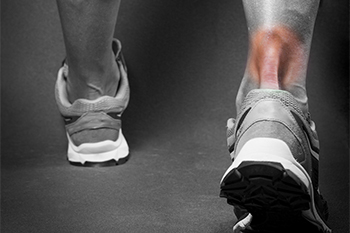
An Achilles tendon tear occurs when the tendon attaching the calf muscle to the heel completely tears. This injury is common and is often seen in middle-aged male sports enthusiasts. The Achilles tendon is the largest tendon in the body and can be prone to injury when sudden, explosive movement involved in running and jumping sports occurs during sports or exercise. Interestingly, taking certain antibiotics or cortisone shots can increase the likelihood of one tearing their Achilles. When this happens, one will feel a sudden pain behind the ankle. A pop or snap may be heard and one can feel like they have been kicked in the heel suddenly. It will make pointing toes down difficult and there may be swelling and bruising around the tendon. If you feel you might have torn your Achilles tendon or want more information to prevent this painful injury, consult with a podiatrist.
Achilles tendon injuries need immediate attention to avoid future complications. If you have any concerns, contact Vivian C. Iwu, DPM of Choice Podiatry Center. Our doctor can provide the care you need to keep you pain-free and on your feet.
What Is the Achilles Tendon?
The Achilles tendon is a tendon that connects the lower leg muscles and calf to the heel of the foot. It is the strongest tendon in the human body and is essential for making movement possible. Because this tendon is such an integral part of the body, any injuries to it can create immense difficulties and should immediately be presented to a doctor.
What Are the Symptoms of an Achilles Tendon Injury?
There are various types of injuries that can affect the Achilles tendon. The two most common injuries are Achilles tendinitis and ruptures of the tendon.
Achilles Tendinitis Symptoms
- Inflammation
- Dull to severe pain
- Increased blood flow to the tendon
- Thickening of the tendon
Rupture Symptoms
- Extreme pain and swelling in the foot
- Total immobility
Treatment and Prevention
Achilles tendon injuries are diagnosed by a thorough physical evaluation, which can include an MRI. Treatment involves rest, physical therapy, and in some cases, surgery. However, various preventative measures can be taken to avoid these injuries, such as:
- Thorough stretching of the tendon before and after exercise
- Strengthening exercises like calf raises, squats, leg curls, leg extensions, leg raises, lunges, and leg presses
If you have any questions please feel free to contact our office located in Marietta, GA . We offer the newest diagnostic tools and technology to treat your foot and ankle needs.
A Low Bed May Help to Limit Falling Incidents
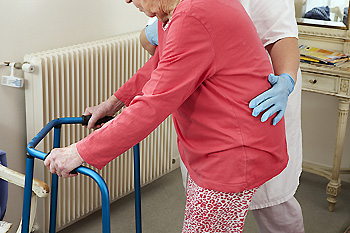
Research has shown that elderly people may be at risk for falling. This can be a result of existing medical conditions, and the body may become weak from the aging process. There are things that can be done which may help to reduce falling episodes. The home may need to be rearranged, which can include removing worn rugs and clutter from the living area and installing grab bars in the shower and toilet area. Additionally, it is beneficial to purchase a bed that is low enough for the feet to touch the floor while sitting on the edge. Performing a routine exercise program can help to strengthen the overall body, possibly reducing the number of falls. Falling may cause the patient to break a foot or a toe, which may lead to the inability to complete daily tasks. If you would like more information about how falling can affect the feet and how to implement additional prevention methods, please consult with a podiatrist.
Preventing falls among the elderly is very important. If you are older and have fallen or fear that you are prone to falling, consult with Vivian C. Iwu, DPM from Choice Podiatry Center. Our doctor will assess your condition and provide you with quality advice and care.
Every 11 seconds, an elderly American is being treated in an emergency room for a fall related injury. Falls are the leading cause of head and hip injuries for those 65 and older. Due to decreases in strength, balance, senses, and lack of awareness, elderly persons are very susceptible to falling. Thankfully, there are a number of things older persons can do to prevent falls.
How to Prevent Falls
Some effective methods that older persons can do to prevent falls include:
- Enrolling in strength and balance exercise program to increase balance and strength
- Periodically having your sight and hearing checked
- Discuss any medications you have with a doctor to see if it increases the risk of falling
- Clearing the house of falling hazards and installing devices like grab bars and railings
- Utilizing a walker or cane
- Wearing shoes that provide good support and cushioning
- Talking to family members about falling and increasing awareness
Falling can be a traumatic and embarrassing experience for elderly persons; this can make them less willing to leave the house, and less willing to talk to someone about their fears of falling. Doing such things, however, will increase the likelihood of tripping or losing one’s balance. Knowing the causes of falling and how to prevent them is the best way to mitigate the risk of serious injury.
If you have any questions, please feel free to contact our office located in Marietta, GA . We offer the newest diagnostic and treatment technologies for all your foot care needs.
We Can Treat Your Foot or Ankle Pain
Treatment of Athlete’s Foot
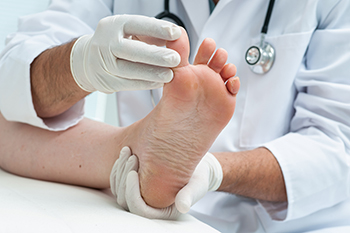
Athlete’s foot, also known as tinea pedis, is a fungal infection that typically starts between the toes. Oftentimes, this occurs in people whose feet have become sweaty while wearing tight-fitting shoes. Symptoms of athlete’s foot include a scaly rash that often causes itching, stinging, and burning. This fungal infection is contagious and can be spread from contaminated floors, towels, or clothing. Athlete’s foot can be treated with over-the-counter antifungal medications, but since it is an infection that frequently returns, it is better to obtain treatment from a podiatrist who has the newest medications in his or her arsenal.
Athlete’s Foot
Athlete’s foot is often an uncomfortable condition to experience. Thankfully, podiatrists specialize in treating athlete’s foot and offer the best treatment options. If you have any questions about athlete’s foot, consult with Vivian C. Iwu, DPM from Choice Podiatry Center. Our doctor will assess your condition and provide you with quality treatment.
What Is Athlete’s Foot?
Tinea pedis, more commonly known as athlete’s foot, is a non-serious and common fungal infection of the foot. Athlete’s foot is contagious and can be contracted by touching someone who has it or infected surfaces. The most common places contaminated by it are public showers, locker rooms, and swimming pools. Once contracted, it grows on feet that are left inside moist, dark, and warm shoes and socks.
Prevention
The most effective ways to prevent athlete’s foot include:
- Thoroughly washing and drying feet
- Avoid going barefoot in locker rooms and public showers
- Using shower shoes in public showers
- Wearing socks that allow the feet to breathe
- Changing socks and shoes frequently if you sweat a lot
Symptoms
Athlete’s foot initially occurs as a rash between the toes. However, if left undiagnosed, it can spread to the sides and bottom of the feet, toenails, and if touched by hand, the hands themselves. Symptoms include:
- Redness
- Burning
- Itching
- Scaly and peeling skin
Diagnosis and Treatment
Diagnosis is quick and easy. Skin samples will be taken and either viewed under a microscope or sent to a lab for testing. Sometimes, a podiatrist can diagnose it based on simply looking at it. Once confirmed, treatment options include oral and topical antifungal medications.
If you have any questions, please feel free to contact our office located in Marietta, GA . We offer the newest diagnostic and treatment technologies for all your foot care needs.
Choosing the Correct Running Shoe
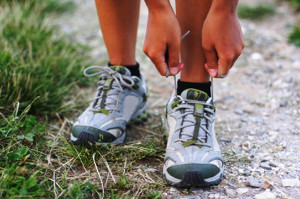
It is beneficial to decide which type of running is desired before choosing the right running shoe. An important factor to look for is comfort and it is helpful to try the shoes on to find the most fitting pair. Various running styles can range from sprints to longer runs, in addition to types of running consisting of treadmill or street running. Shoes that have extra cushioning may be adequate for easier running and may not be suitable for sprints because of how heavy they can be. People who enjoy trail running may choose shoes that have soles with extra tread, as compared to flatter soles that are found on road shoes. When running is done on hard surfaces, it may add strain to the ankles. For this reason, shoes that have additional support features might be the better choice and may help to prevent injury too. If you are considering purchasing running shoes, please consult with a podiatrist who can successfully guide you in choosing the right running shoe.
You should always make sure your running shoes fit properly in order to avoid injury. For more information, contact Vivian C. Iwu, DPM from Choice Podiatry Center. Our doctor can provide the care you need to keep you pain-free and on your feet.
Choosing the Right Running Shoe for Your Foot Type
Improper shoe sizing can cause a myriad of problems for your feet. Shoes that don’t fit you properly can lead to muscular imbalances in your body, which can result in foot, knee, and hip injuries.
Tips for Finding the Right Running Shoe
- Make sure you have a thumb’s width of wiggle room between the end of your longest toe and the front of the shoe.
- There should be little to no slipping at the heel
- Don’t assume your size in one shoe brand will be your size in another
- Do not lace up your shoes too tightly
- Walk around in the store with your new shoes before you buy them
If you have any questions please feel free to contact our our office located in Marietta, GA . We offer the newest diagnostic and treatment technologies for all your foot and ankle needs.
Two Types of Hammertoe
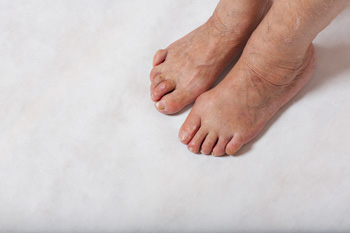
Hammertoe is considered to be a foot deformity. It is a fairly common ailment and can be caused by genetic reasons, or by wearing shoes that are too tight. When these types of shoes are frequently worn, the toes can squeeze together, causing the middle joint in the second and third toes to bend down, resembling a hammer. Hammertoe can fall into two categories which are known as flexible or rigid. It is easier to treat flexible hammertoe because the joints are much more pliable, and they can be bent back to their natural place. Conversely, rigid hammertoe is considered to be severe, and surgery may be the only option for permanent straightening. Some of the symptoms that accompany hammertoe can include foot pain, corns that form on top of the toes, and the range of motion may be limited. If you have signs of developing hammertoe, please schedule an appointment with a podiatrist as quickly as possible who can help you with the treatment option that is correct for you.
Hammertoe
Hammertoes can be a painful condition to live with. For more information, contact Vivian C. Iwu, DPM from Choice Podiatry Center. Our doctor will answer any of your foot- and ankle-related questions.
Hammertoe is a foot deformity that affects the joints of the second, third, fourth, or fifth toes of your feet. It is a painful foot condition in which these toes curl and arch up, which can often lead to pain when wearing footwear.
Symptoms
- Pain in the affected toes
- Development of corns or calluses due to friction
- Inflammation
- Redness
- Contracture of the toes
Causes
Genetics – People who are genetically predisposed to hammertoe are often more susceptible
Arthritis – Because arthritis affects the joints in your toes, further deformities stemming from arthritis can occur
Trauma – Direct trauma to the toes could potentially lead to hammertoe
Ill-fitting shoes – Undue pressure on the front of the toes from ill-fitting shoes can potentially lead to the development of hammertoe
Treatment
Orthotics – Custom made inserts can be used to help relieve pressure placed on the toes and therefore relieve some of the pain associated with it
Medications – Oral medications such as anti-inflammatories or NSAIDs could be used to treat the pain and inflammation hammertoes causes. Injections of corticosteroids are also sometimes used
Surgery – In more severe cases where the hammertoes have become more rigid, foot surgery is a potential option
If you have any questions please contact our office located in Marietta, GA . We offer the newest diagnostic and treatment technologies for all your foot and ankle needs.


